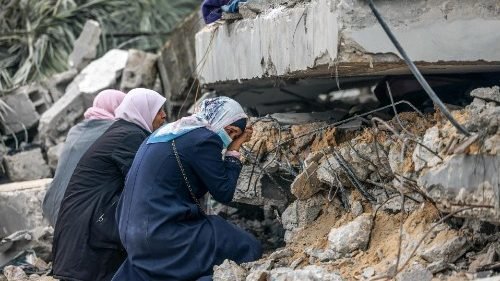Upon his return from his mission to the Holy Land at the request of Pope Francis, Cardinal Konrad Krajewski, the papal almoner, reflects on his experience near the war in Gaza, noting that suffering and conflict arise when humanity seeks its own path without considering God’s desires for us.
By Cardinal Konrad Krajewski
I travelled to the Holy Land with faith and prayer, to these places where war rages, where there is hatred, and vengeance, where one kills the other, where there is a lack of water, food, and electricity. Even during Christmas, the holiest of days for us, they did not stop fighting and killing – in Ukraine as in the Gaza Strip.
I arrived in this land with the most sophisticated weapons in the world: faith and prayer, which can move mountains and end conflicts… But why isn’t it so?
I went to all the places where Jesus lived. I went to Nazareth, to Bethlehem, to the place where He was crucified, was killed, and rose again. Thus, I asked: “Lord, why is there no peace? You want peace.” I have always reflected on this prayer: “Deliver us, Lord, from every evil, and grant us peace in our day.” So why don’t you grant peace in our days?
I have thought a lot about how, when we enter the Holy Sepulchre, we must bow down, almost breaking our backs to enter. In many churches, even in Bethlehem, we must bow down, bow down before the mystery.
So, I think that perhaps the world has stopped bowing down to God and has stopped living according to the logic of the Gospel because it has become accustomed to the logic of the world.
Perhaps we humans have put ourselves in God’s place and want to command and condemn, but we do so without mercy, without love. Maybe that’s why there is no peace—because we no longer bow down to God, before the mystery.
Wednesday was the feast of St. John the Apostle; he approached Jesus’ tomb, bowed down to enter, to see that His body was no longer there, that He had risen.
But today we no longer bow down, even though the doors here in the Holy Land tell us that we must do so to understand the mystery of God, to understand His love and His mercy, to live according to the logic of Jesus’ teachings, according to the logic of the Gospel.
I thank the Lord for having lived these days in the Holy Land and for beginning to understand the mystery of God. The prayer of Our Father, the prayer that Jesus taught us, says, “Thy will be done, Lord,” not mine, because where there is my will, there are wars, there are many deaths.
“Thy kingdom come,” not ours, ours is the kingdom of destruction. “Hallowed be Thy name,” not mine; when my name is hallowed, I am dangerous to others.
After the Our Father, the priest says, “Deliver us, O Lord, from evil, and grant peace in our day.” My hope is that peace may truly blossom in the hearts of men.



